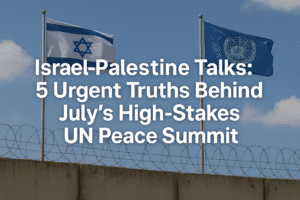Israel-Palestine Talks: 5 Urgent Truths Behind July’s High-Stakes UN Peace Summit
Late July’s rescheduled UN conference, co-chaired by France and Saudi Arabia, aims to revive the two-state solution after Israel’s Iran strikes derailed June’s summit. The delay offers breathing room but heightens urgency amid Gaza’s humanitarian collapse. Macron’s call for Franco-British recognition of Palestine signals a strategic European pivot to break the deadlock, though its impact hinges on tying symbolism to concrete security and governance reforms. Attendance remains uncertain—Israel may boycott, U.S. engagement is hampered by elections, and Palestinian representation lacks unity.
The France-Saudi partnership bridges Western-Arab interests but faces resistance from traditional power brokers. Success won’t mean immediate peace but measurable steps: timelines for Palestinian elections, binding aid access for Gaza, and revived Saudi-Israel normalization talks alongside statehood progress. With regional volatility escalating, these talks represent a narrow window to prevent irreversible fragmentation.

Israel-Palestine Talks: 5 Urgent Truths Behind July’s High-Stakes UN Peace Summit
The abrupt postponement of June’s high-stakes UN conference on Israeli-Palestinian peace—derailed by Israel’s military action against Iran—was a stark reminder of how quickly regional volatility can upend diplomacy. Now rescheduled for July 28–29 in New York, this gathering faces even higher stakes amid a fragmented geopolitical landscape. Here’s what truly matters:
1. The Timing Isn’t Arbitrary
The late-July window offers critical breathing room. It allows:
- Cooling tensions after Iran-Israel clashes shifted global focus.
- Potential recalibration of positions from key players (notably the U.S., Arab states, and the EU).
- Space for behind-the-scenes talks on prisoner exchanges or Gaza aid—confidence-building measures long proven essential to any viable negotiation process.
2. Macron’s Gambit: Symbolism or Catalyst?
France’s push for joint UK-France recognition of Palestinian statehood (echoed during Macron’s UK state visit) signals a strategic pivot:
- Why now? With U.S. influence waning and Saudi normalization with Israel frozen, European powers seek relevance.
- The subtext: Recognition isn’t just moral posturing—it pressures Israel to engage meaningfully or risk unilateral actions solidifying facts on the ground.
- The risk: Empty gestures could harden positions. Recognition must tie to concrete security guarantees for Israel and governance reforms by Palestinian authorities.
3. The Silent Question: Who Will Actually Show Up?
Originally planned for heads of state, the conference now faces attendance uncertainty. Key variables:
- Israel: Will PM Netanyahu’s government engage, or boycott amid global criticism?
- The U.S.: Election-year politics may limit Biden’s commitments.
- Palestinian Factions: Can the PA credibly represent divided interests?
Without top-tier participation, momentum evaporates.
4. The France-Saudi Co-Chair Dynamic: A New Axis?
This unlikely pairing is telling:
- Saudi Arabia wields religious authority and normalization leverage.
- France offers EU clout and historical ties.
Together, they bridge Western and Arab perspectives—but can they navigate U.S.-Israel resistance to external solutions?
The Path Forward: Realism Over Optimism
History warns against overhyping “peace conferences.” Yet this moment is distinct:
- The Gaza war’s devastation makes status quo untenable.
- Regional actors (Egypt, Qatar, Saudi) increasingly dictate terms, not Washington.
- Youth-led protests globally demand action, not rhetoric.
What Success Looks Like: Not a signed deal, but:
✅ Firm timelines for Palestinian elections.
✅ Binding aid access guarantees for Gaza.
✅ Israel-Saudi normalization talks revived alongside Palestinian statehood steps.
The July talks won’t end a 76-year conflict—but they can prevent its unraveling into irreversible fragmentation. The world will judge leaders not by their attendance, but by their courage to trade short-term politics for lasting security.
You must be logged in to post a comment.